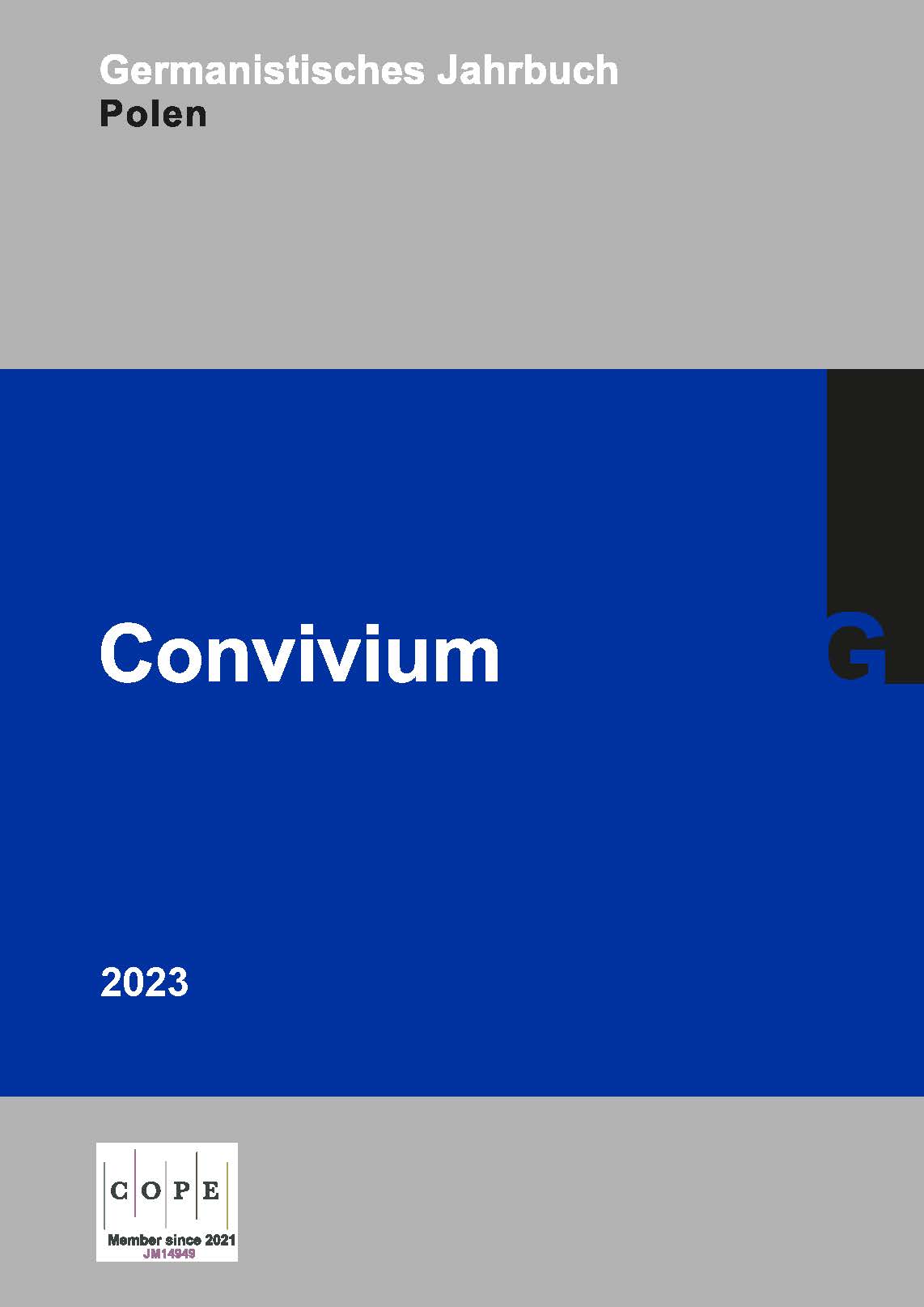Moodle-Plattform zum Erlernen von Deutsch als zweite Fremdsprache
DOI:
https://doi.org/10.18778/2196-8403.2023.02Schlagworte:
Fernunterricht, elektronische Ressourcen, Moodle, Fremdsprache, sozio-linguistische Kompetenz, kommunikative Kompetenz, berufliche KompetenzAbstract
Der Artikel befasst sich mit den methodischen Prinzipien der Organisation von Blended Learning für das Erlernen von Deutsch als Zweitsprache an der Abteilung für Angewandte Linguistik der Nationalen Universität „Lviv Polytechnic“. Die Autorinnen fassen die Erfahrungen in- und ausländischer Forscher*innen mit der Implementierung von Blended Learning und der Technologie für Fernunterricht in der virtuellen Lernumgebung Moodle zusammen.
Es wird festgestellt, dass die auf der E-Learning-Plattform entwickelten und angebotenen Deutschkurse zur Entwicklung der kommunikativen Kompetenz und der Kommunikationsbereitschaft in verschiedenen Bereichen des öffentlichen Lebens beitragen. Die Untersuchung zeigt die Möglichkeit der Nutzung der Moodle-Plattform für die Entwicklung von Fremdsprachenkursen durch Studierende. Die Plattform bietet die Möglichkeit der Online-Präsentation von Lehrmaterial in einer Gruppe, am Arbeitsplatz der Studierenden, sowie ausreichende methodische Unterstützung in Form von Audio- und Videomaterial. Der Lernprozess ist das Ergebnis der Zusammenarbeit zwischen Lehrer*innen und Studierenden im Netz mit Hilfe von Informationstechnologien wie Videokonferenzen, Chats, Foren und E-Mail. Mit Hilfe der Moodle-Plattform wurde ein System zur automatischen Kontrolle und Selbstkontrolle des erworbenen Wissens, zur Anfangs- und Endkontrolle und ein verfügbares elektronisches Notenbuch entwickelt, das die Lerneffizienz verbessert und die Motivation der Teilnehmer*innen an dieser Art des Lernens erhöht. Diese Studie beweist, dass die elektronische Plattform für das Erlernen einer Fremdsprache für beide Seiten des Prozesses effektiv ist: nicht nur für die Lernenden, sondern auch für die Lehrenden.
Literaturhinweise
ASOJANTS, PETER (2014): Методичні переваги використання інформаційно-комунікаційних технологій у процесі формування англомовної професійно орієнтованої лексичної компетенції [Methodological advantages of using infor-mation and communication technologies in the process of forming English-speaking professionally oriented lexical competence]. In: Теоретичні питання культури, освіти та виховання. [Theoretical issues of culture, education and upbringing] 49:90-97: http://nbuv.gov.ua/UJRN/Tpkov_2014_49_25 (09.11.2022).
Google Scholar
BESKORSA, OLENA (2017): Система Moodle як засіб організації змішаного навчання практичної фонетики німецької мови [Moodle system as a means of organizing blended learning of practical phonetics of the German language]. In: Інформаційні технології та засоби навчання. [Information technologies and learning tools] 62(6):86-97: https://journal.iitta.gov.ua/index.php/itlt/rticle/view/1832/1282 (09.11.2022).
Google Scholar
DOI: https://doi.org/10.33407/itlt.v62i6.1832
BEZLYUDNY, OLEKSII (2019): Досвід використання змішаного навчання на заняттях з англійської мови в закладах вищої педагогічної освіти [Experience of using blended learning in English classes in institutions of higher pedagogical education]. In: Інформаційні технології та засоби навчання. [Information technologies and learning tools] 73(5):86-100: https://journal.iitta.gov.ua/index.php/itlt/article/view/2669/1566 (02.12.2022).
Google Scholar
DOI: https://doi.org/10.33407/itlt.v73i5.2669
BUGAYCHUK, KONSTANTYN (2016): Змішане навчання: теоретичний аналіз та стратегія впровадження в освітній процес вищої школи [Blended learning: theoretical analysis and implementation strategy in the educational process of higher education].
Google Scholar
DOI: https://doi.org/10.33407/itlt.v54i4.1434
In: Інформаційні технології та засоби навчання. [Information technologies and learning tools] 54(4):1-18: https://journal.iitta.gov.ua/index.php/itlt/article/view/1434/1070 (14.12.2022).
Google Scholar
BYKOV, YURII (2013): Мобільний простір та мобільно-орієнтоване середовище користувача Інтернету: особливості модельного представлення та освітнього застосування [Mobile space and mobile-oriented Internet user environment: features of model representation and educational application]. In: Інформаційні технології та засоби навчання. [Information technologies and learning tools] 17:9-37: https://jour-nal.iitta.gov.ua/index.php/itlt/article/view/2669/1566 (05.12.2022).
Google Scholar
DOLINSKY, EUGEN (2013): Можливості використання навчального середовища Moodle під час вивчення іноземних мов та перекладу [Possibilities of using the Moodle learning environment when learning foreign languages and translation]. In: Збірник наукових праць Хмельницького інституту соціальних технологій Університету «Україна». [Collection of scientific papers of the Khmelnytsky Institute of Social Technologies of the University “Ukraine”] 1 (7):82-85: http://nbuv.gov.ua/UJRN/Znpkhist_2013_1_20 (14.12.2022).
Google Scholar
GEE, PETER (2012): Blended course design: a synthesis of best practices. In: Journal of Asynchronous Learning Networks16(4):7-22.
Google Scholar
DOI: https://doi.org/10.24059/olj.v16i4.239
GLINSKY, YAROSLAV (2021): “Досвід змішаного навчання інформатики студентів економічних спеціальностей з використанням LMS MOODLE та YUOTUBE”. [Experience of mixed teaching of informatics of students of economic specialties with the use of LMS MOODLE and YUOTUBE]. In: Інформаційні технології та засоби навчання. [Information technologies and learning tools] 83(3):113-124: https://journal.iitta.gov.ua/index.php/itlt/article/view/3945/1808 (24.11.2022).
Google Scholar
DOI: https://doi.org/10.33407/itlt.v83i3.3945
KOROTUN, OLGA (2016): Методичні засади змішаного навчання у вищій освіті [Methodological principles of blended learning in higher education]. In: Інформаційні технології в освіті. [Information technologies in education] 3(28):117-129: http://ite.kspu.edu/Issue_28/p-117-129 (21.12.2022).
Google Scholar
DOI: https://doi.org/10.14308/ite000607
KUKHARENKO, VOLODYMYR (2016): Теорія і практика змішаного навчання. [Theory and practice of blended learning]. Харків.
Google Scholar
SHCHEGLOVA, ALLA (2016): Місце методу проектів для формування та розвитку іншомовної комунікативної компетентності студентів у змішаному навчальному середовищі [The place of the project method for the formation and development of foreign language communicative competence of students in a blended learning environment]. In: Інформаційні технології в освіті. [Information technologies in education] 53(3):142-149: https://journal.iitta.gov.ua/index.php/itlt/article/view/1381/1044 (10.01.2023).
Google Scholar
DOI: https://doi.org/10.33407/itlt.v53i3.1381
SPRING, KRISTOF (2016): The current landscape of international blended learning. In: International Journal of Technology Enhanced Learning 8(1):84-102.
Google Scholar
DOI: https://doi.org/10.1504/IJTEL.2016.075961
WORKING PROGRAM of the academic discipline WB 2.11 “Translation Workshop (German language)”. Part 2: http://vns.lpnu.ua/course/view.php?id=5430 (16.01.2023).
Google Scholar
НАКАЗ МОН “Про внесення змін до Положення про електронні освітні ресурси” [ORDER OF THE the Ministry of Education and Science “On Amendments to the Reg¬ulations on Electronic Educational Resources”] (29.05.2019): № 749.: https://ips.ligazakon.net/document/view/Re33637?an=1 (10.01.2023).
Google Scholar
MOODLE (2022): http://vns.lpnu.ua/course/view.php?id=7695 (07.12.2022).
Google Scholar
MOODLE (2022): http://vns.lpnu.ua/course/view.php?id=5430 (07.12.2022).
Google Scholar
MOODLE (2022): http://vns.lpnu.ua/course/view.php?id=4922 (07.12.2022).
Google Scholar
Downloads
Veröffentlicht
Zitationsvorschlag
Ausgabe
Rubrik
Lizenz

Dieses Werk steht unter der Lizenz Creative Commons Namensnennung - Nicht-kommerziell - Keine Bearbeitungen 4.0 International.










